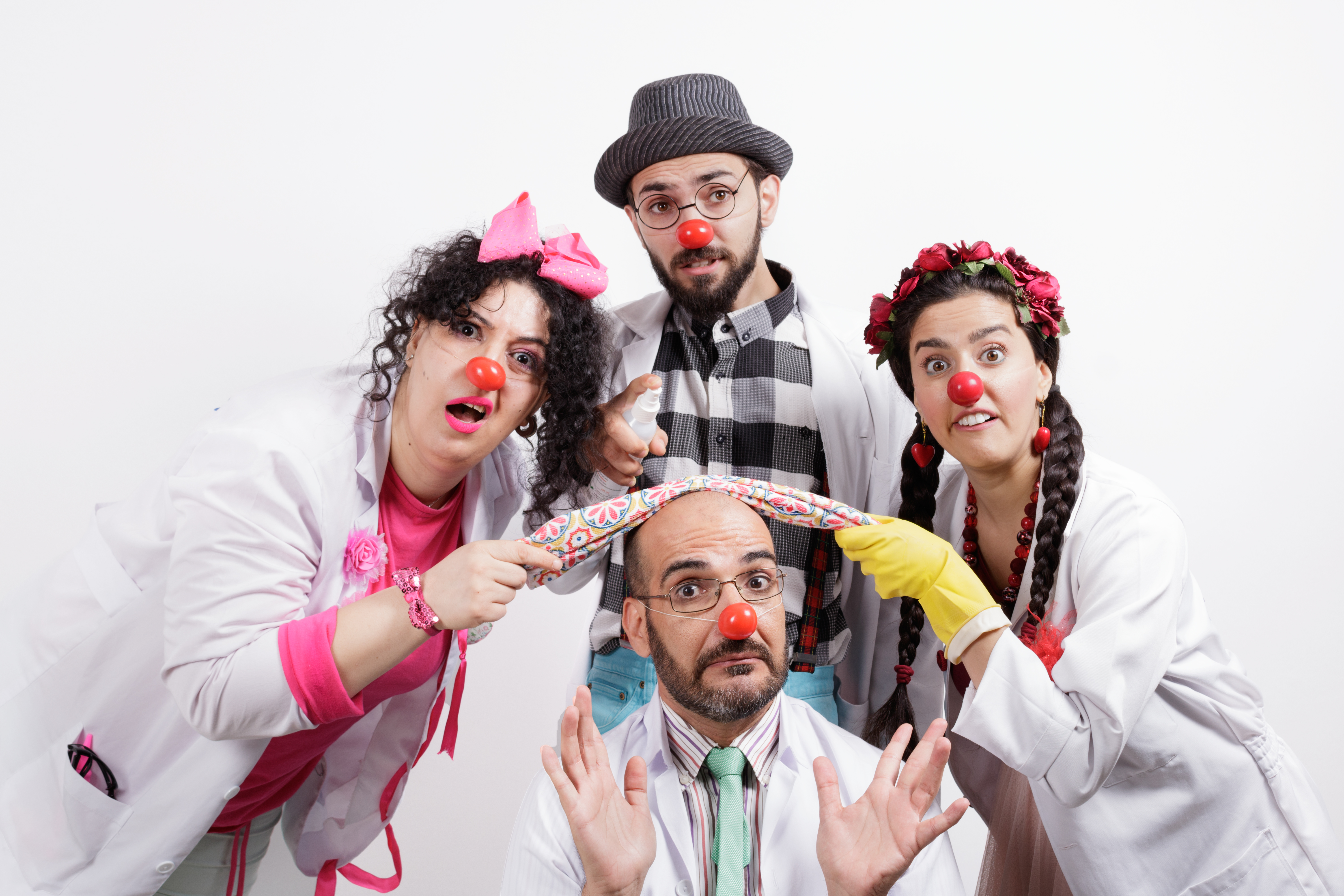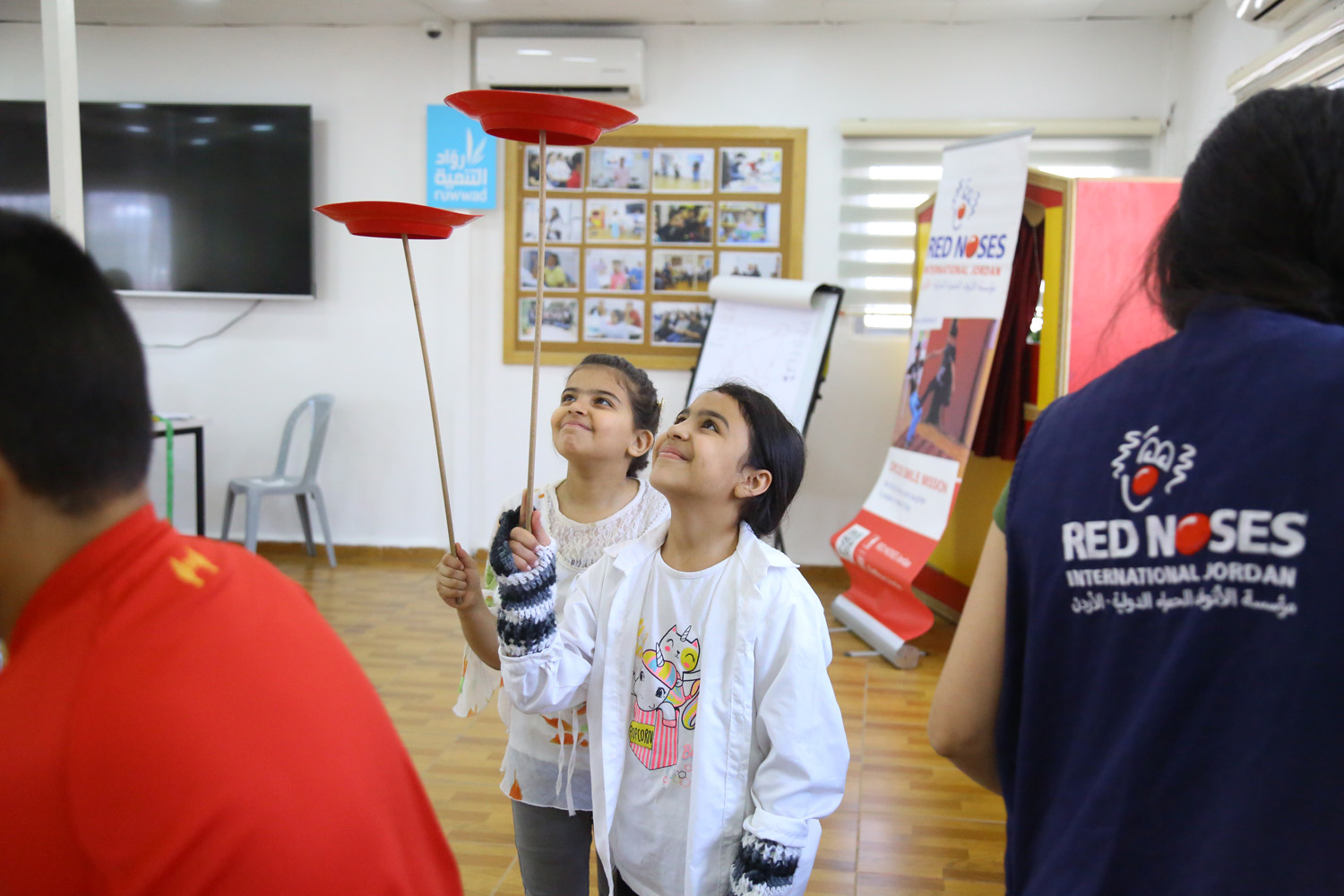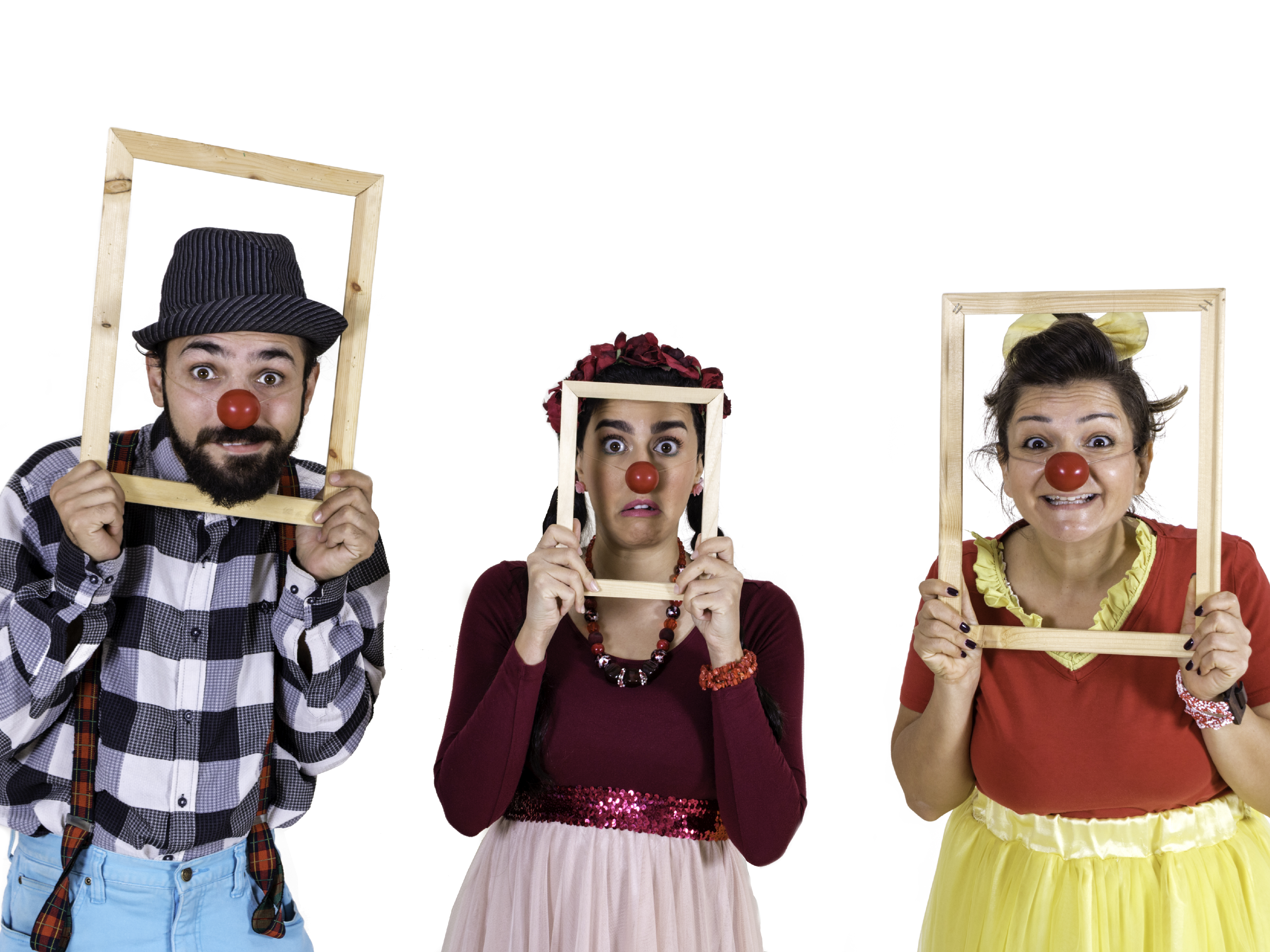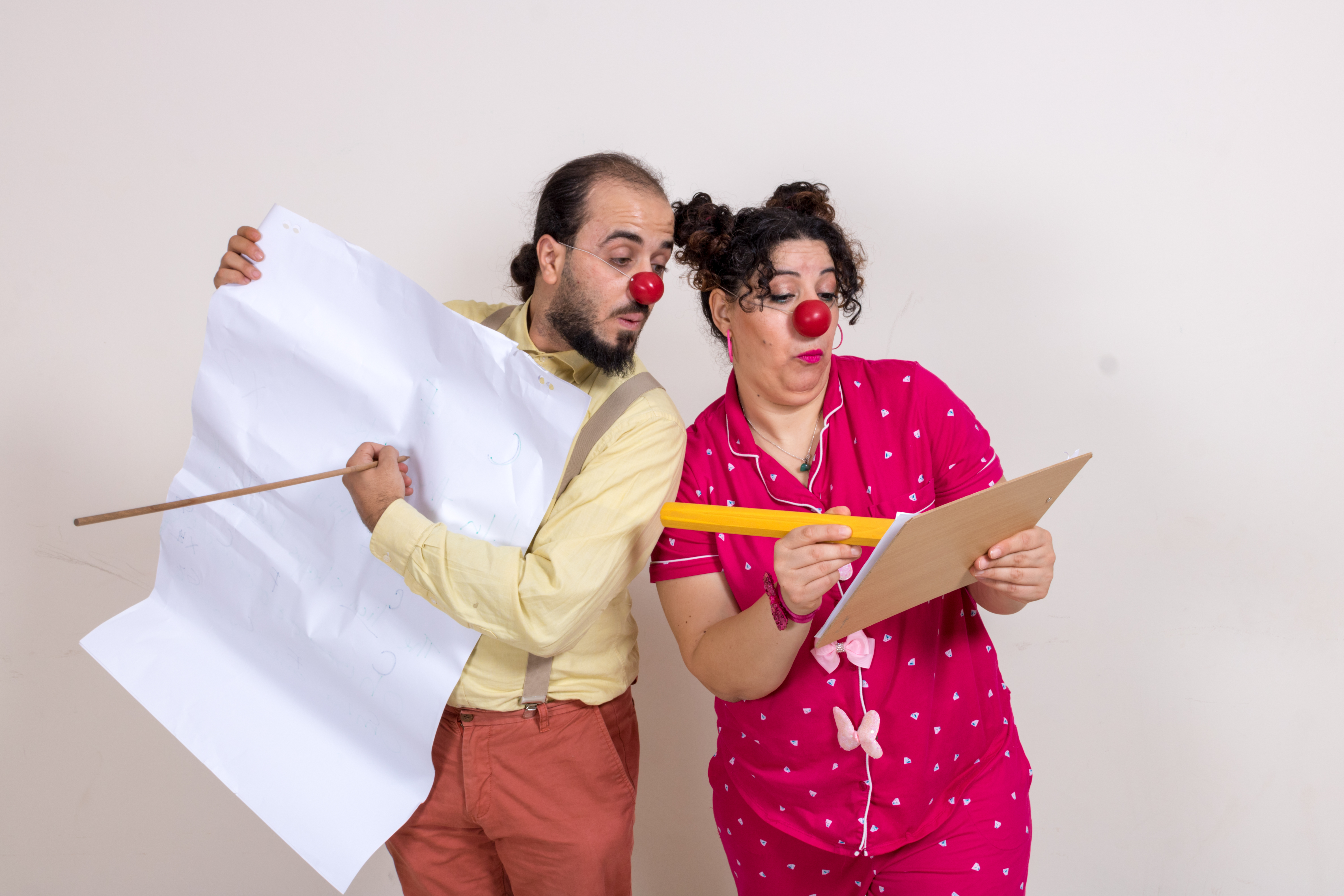
The need for joy
Many children struggle to cope with the hospital environment.
The pain, confusion, loss of control, and separation from family associated with medical treatments may lead to Pediatric Medical Traumatic Stress, which can have long-term effects on a child’s physical and mental health (Price et al, 2016).
Other institutions create similar distress. Refugee and migrant camps are ill-equipped to support displaced children, who are at high risk of post-traumatic stress disorder, anxiety, and depression (Sirin & Rogers-Sirin, 2015). Depressive symptoms are also widespread in care facilities among elderly inpatients, especially those with cognitive dysfunctions like dementia (Linka et al, 2000).

The difference a clown makes
Healthcare clown research is a fairly new field, with the first study on the impact of clowndoctors conducted as recently as 2005. In that pioneering study, Laura Vagnoli and her colleagues found that children waiting to undergo anesthesia were significantly less anxious if they spent 15 minutes with a clown (Vagnoli et al, 2005).
Since then, numerous experiments have documented the positive impact of clown visits to children in hospitals (Dionigi, 2018; Sridharan & Sivaramakrishnan, 2016). Children visited by a clown have lower cortisol levels in their saliva, which indicates lower stress (Saliba et al, 2016); they report lower pain during invasive procedures (Ben-Pazi et al, 2017); and they are less likely to need sedation (Viaggiano et al, 2015).

Not just for kids
Initial studies show that clowns can benefit adults as well (Auerbach et al., 2016), including parents (Agostini et al., 2014) and hospital staff (Barkmann et al., 2013). Healthcare clowning in nursing homes seems to reduce moderate to severe behavioural and psychological symptoms of dementia, primarily of the Alzheimer’s type, suggesting that this so-called elder-clowning approach may be a promising tool to improve Alzheimer’s dementia care (Kontos et al., 2016). Taken together, the results of recent studies suggest that healthcare clowning is beneficial for all age groups.

How the magic works
Existing research shows that humour and laughter promote health at various levels, suggesting that by maintaining a positive emotional state humour may help to sustain a body’s basic health and healing mechanisms (McGhee, 2010). Humour can be viewed as an important emotion regulation mechanism – the positive emotion of mirth accompanying humour replaces negative feelings and experience of adversities, enabling a person to think more broadly and flexibly and to engage in creative problem solving (Martin, 2007).

Commitment to learning
RED NOSES is committed becoming a leading authority amongst clowndoctor organisations, specialising in scientific research on the use and impact of humour within the healthcare, educational and humanitarian sectors. We are committed to build and maintain a “research culture” exploring all aspects of bringing joy and laughter to the sick and suffering.
Additional information
- Agostini, F., Monti, F., Neri, E., Dellabartola, S., De Pascalis, L., & Bozicevic, L. (2014). Parental anxiety and stress before pediatric anesthesia: A pilot study on the effectiveness of preoperative clown intervention. Journal of Health Psychology, 19, 587-601. (http://journals.sagepub.com/doi/abs/10.1177/1359105313475900)
- Alexander, J., & Manno, M. (2003). Underuse of analgesia in very young pediatric patients with isolated painful injuries. Annual Emergency Medicine, 41, 617-622. (https://www.ncbi.nlm.nih.gov/pubmed/12712027 )
- Auerbach, S., Ruch, W., & Fehling, A. (2016). Positive emotions elicited by clowns and nurses: An experimental study in a hospital setting. Translational Issues in Psychological Science (Special Issue: The Psychology of Humor), 2, 14-24. (http://www.zora.uzh.ch/id/eprint/130327/1/257_m_2016_AuerbachRuchFehling.pdf)
- Barkmann, C., Siem, A., Wessolowski, N., Schulte-Markwort, M. (2013). Clowning as a supportive measure in paediatrics – a survey of clowns, parents and nursing staff. BMC Pediatrics, 13, 166. (https://bmcpediatr.biomedcentral.com/articles/10.1186/1471-2431-13-166)
- Ben-Pazi, H., Cohen, A., Kroyzer, N., Lotem-Ophir, R., Shvili, Y., Winter, G., et al. (2017). Clown-care reduces pain in children with cerebral palsy undergoing recurrent botulinum toxin injections- A quasi-randomized controlled crossover study. PLoS ONE 12(4): e0175028.(https://journals.plos.org/plosone/article?id=10.1371/journal.pone.0175028)
- Dionigi, A. (2018). Healthcare Clowning: Use of Specific Complementary and Alternative Medicine for Hospitalized Children. OBM Integrative and Complementary Medicine. 3 (2). (https://www.researchgate.net/publication/325511388_Healthcare_Clowning_Use_of_Specific_Complementary_and_Alternative_Medicine_for_Hospitalized_Children)
- Dionigi, A., Flangini, R., & Gremigni, P. (2012). Clowns in hospital. In P. Gremigni (Ed.), Humor and health promotion (pp. 213-228). New York: Nova Science Publishers. (https://www.researchgate.net/publication/259892132_Clowns_in_Hospital)
- Kocherov, S. et al. (2016). Medical clowns reduce pre-operative anxiety, post-operative pain and medical costs in children undergoing outpatient penile surgery: A randomised controlled trial. Journal of Paediatrics and Child Health, 52, 877-881. (http://onlinelibrary.wiley.com/doi/10.1111/jpc.13242/full)
- Kontos, P. et al. (2016). Elder-clowning in long-term dementia care: Results of a pilot study. Journal of the American Geriatric Society, 64, 347-353. (https://www.ncbi.nlm.nih.gov/pubmed/26889843)
- Markova, G. et al. (in preparation). Understanding of and reaction to RED NOSES clown humour by hospitalized infants and toddlers: A pilot study.
- Martin, R. A. (2007). The psychology of humor: An integrative approach. Burlington, MA: Elsevier. (http://www.sciencedirect.com/science/book/9780123725646)
- Linka, E., Bartkó, G., Agárdi, T., & Kemény, K. (2000). Dementia and Depression in Elderly Medical Inpatients. International Psychogeriatrics, 12(1), 67-75. (https://www.cambridge.org/core/journals/international-psychogeriatrics/article/dementia-and-depression-in-elderly-medical-inpatients/4820DB38E6A27B5BA11ED088F60903A1)
- McGhee, P. (2010). Humor: The lighter path to resilience and health. Bloomington, IN: Authorhouse. (https://www.goodreads.com/book/show/9097360-humor)
- Price, J., Kassam-Adams, N., Alderfer, M., Christofferson, J., & Kazak, A. (2016). Systematic Review: A Reevaulation and Update of the Integrative (Trajectory) Model of Pediatric Medical Traumatic Stress. Journal of Pediatric Psychology, 41(1), 86–97. <https://www.researchgate.net/publication/281363830_Systematic_Review_A_Reevaluation_and_Update_of_the_Integrative_Trajectory_Model_of_Pediatric_Medical_Traumatic_Stress_Figure_1>
- Rennick, J.E., & Rashotte, J. (2009). Psychological outcomes in children following paediatric intensive care unit hospitalization: a systematic review of the research. Journal of Child Health Care, 13, 128- 149. (https://www.ncbi.nlm.nih.gov/pubmed/19458168)
- Saliba, F., Adiwardana, N., Uehara, E., Silvestre, R., Leite, V., Faleiros, F., Padovani, F., & Gobbi, J. (2016). Salivary cortisol levels: the importance of clown doctors to reduce stress. Pediatric Reports, 8:6188, 12-14.
- Sirin, S., & Rogers-Sirin, L. (2015). The Educational and Mental Health Needs of Syrian Refugee Children. Washington, DC: Migration Policy Institute. (https://www.migrationpolicy.org/research/educational-and-mental-health-needs-syrian-refugee-children )
- Smerling, A. J., Skolnick, E., Bagiella, E., Rose, C., Labinsky, E., & Tager, F. (1999). Perioperative clown therapy for pediatric patients. Anesthesia & Analgesia, 88, 243-56. (https://journals.lww.com/anesthesia-analgesia/Fulltext/1999/02001/PERIOPERATIVE_CLOWN_THERAPY_FOR_PEDIATRIC_PATIENTS.303.aspx )
- Sridharan, K., & Sivaramakrishnan,G. (2016). Therapeutic clowns in paediatrics: a systematic review and meta-analysis of randomized controlled trails. European Journal Paediatrics, 175, 1353-1560. (https://www.ncbi.nlm.nih.gov/pubmed/27605131)
- Vagnoli, L., Caprilli, S., Robiglio, A., & Messeri, A. (2005). Clown Doctors as a Treatment for Preoperative Anxiety in Children: A Randomized, Prospective Study. Pediatrics 116 (4), 563-567. (https://www.researchgate.net/publication/235383619_Clown_intervention_to_reduce_preoperative_anxiety_in_children_and_parents_A_randomized_controlled_trial)
- Viaggiano, M. P., Giganti, F., Rossi, A., Di Feo, D., Vagnoli, L., Calcagno, G., & Defilippi, C. (2015). Impact of psychological interventions on reducing anxiety, fear and the need for sedation in children undergoing magnetic resonance imaging. Pediatric Reports, 7, 5682. (https://www.ncbi.nlm.nih.gov/pmc/articles/PMC4387329/)
- Zyga, S. et al. (2016). Assessing factors that affect strategies among nursing personnel. Materia Socio Medica, 28, 146. (https://www.ncbi.nlm.nih.gov/pmc/articles/PMC4851525/)


